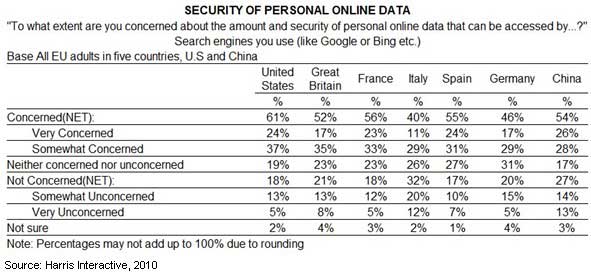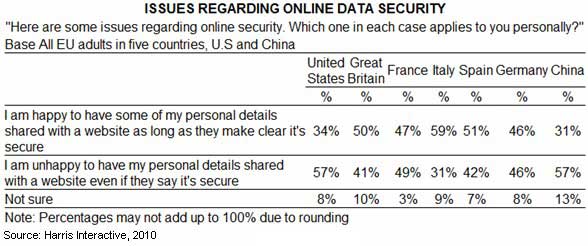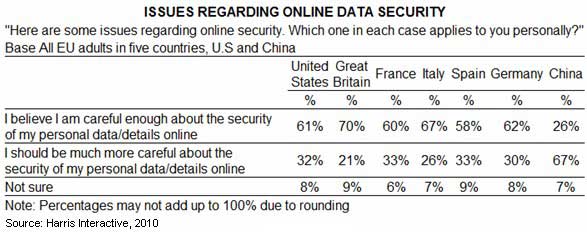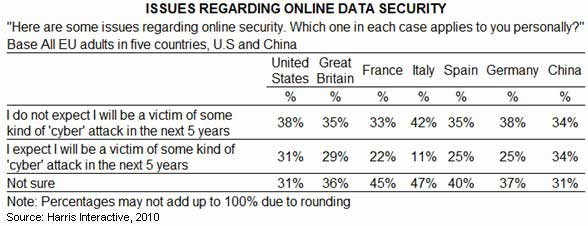Consumers are uneasy about the security of their personal information online: 61% of Americans say they are concerned about the amount and security of personal online data that can be accessed by search engines, such as Google or Bing, and 64% are concerned over the amount and security of personal online data that can be accessed by Internet service providers (ISPs), according to a new Financial Times/Harris Poll.
Overall, Americans are more worried than Western European and Chinese consumers about the security of online data accessible by search engines, but concerns are pervasive across the countries surveyed:

Security Reassurance Needed
Most US consumers are uncomfortable sharing personal information online: 57% say they are unhappy sharing personal details with websites, even if security assurances are given, while 34% say they are happy to share information as long as security is ensured.

Britons are more willing to share information online: 50% say they are happy to share information online as long as security is ensured, and just 41% say they are uncomfortable sharing information online.
Consumers Fear Hacking Most
Over eight in ten (81%) of US consumers say they are either very or somewhat concerned about the amount and security of personal online data that can be accessed by cybercriminals and hackers; over one-half (55%) are very concerned.
Meanwhile, fewer Britons (73%) say they are concerned about hacking, including 42% who are very concerned.
Looking for real, hard data that can help you match social media tools and tactics to your marketing goals? The State of Social Media Marketing, a 240-page original research report from MarketingProfs, gives you the inside scoop on how 5,140 marketing pros are using social media to create winning campaigns, measure ROI, and reach audiences in new and exciting ways.
Room for Education
Most US consumers (61%) say they are careful enough about the security of their personal data and details online, while nearly one-third (32%) say they should be more careful.

Britons are the most confident about their security efforts: 70% say they are careful enough regarding online security, and only 21% say they should be more careful. Meanwhile, just 26% of Chinese consumers say they are careful enough.
Future Threats of Cybercrime
US consumers are both concerned and uncertain about the threats of cybercrime in the future: 31% expect to be a victim of some kind of cyber attack in the next five years, and 31% say they are unsure about future threats.

Meanwhile, 29% of Britons expect to be a victim of cybercrime in next five years, and 36% say they are unsure. Only 11% of Italian consumers are concerned about future security threats, but nearly one-half (47%) are unsure.
Other findings:
- Nearly two-thirds (62%) of Americans and 53% of Britons say social sites like Facebook and Twitter make many people vulnerable to cyber attacks.
- Germans tend to be more thorough: 53% say they tend to read sites' terms and conditions carefully and are aware of their privacy policies, compared with 38% of Americans and 35% of Britons who do so.
About the data: This Financial Times/Harris Poll was conducted online February 3-10, 2010, by Harris Interactive among a total of 7,256 adults age 16-64 in France (1,093), Germany (1,016), Great Britain (1,097), Spain (1,019), and the US (1,006); adults age 18-64 in Italy (1,004); and adults age 18-60 in China (1,021).



